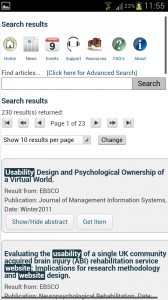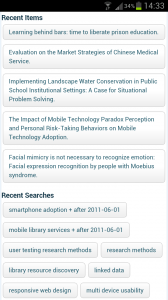1. Prototype discovery tool for delivery of academic content to mobile devices.
The discovery tool draws on the EBSCO API to return search results within the Open University Library’s mobile website. The user requirements and the technical approach for this prototype have been shared elsewhere on this blog.
The project worked with EBSCO to develop and test the prototype system using a combination of open source software (Mobile Web from MIT) and the API from EBSCO Discovery Solution (EDS). The project team sought advice from EBSCO on the use of their API and received input through an EBSCO representative on the Project Board.
The tool searches across most of our third party content as well as local collections such as Open Research Online. The search terms are highlighted within the results and users can read the abstract inline by tapping on the article title. Tapping “get item” takes you to the full text of the article.
Following user feedback we plan to add check boxes to each result which will allow users to select results to save to a bibliographic management tool so that they can access them on other devices.
At the bottom of the screen the individual user’s most recent search terms are listed so that they can easily repeat the search, along with a list of full text items they have accessed so that they can easily find them again.
2. EZproxy bookmarks to mobile databases
OU library users are now able to connect to third party databases which have mobile-friendly interfaces through the EZproxy system. The mobile website now includes a list of mobile-friendly databases with persistent EZproxy links. These links direct the user to authenticate through the OU SAMS authentication system and then connect them to the resource. The user can bookmark the URL and it will still work the same way.
Other authentication options were explored, but the one above was the only one that complied with our licence agreements and the Open University’s security policies.
3. Good practice toolkit
A good practice toolkit for publishers and content providers delivering academic content to handheld devices has been developed as part of the project. Parts of the toolkit may also be of use to libraries. It includes good practice guidelines, basic principles and practical examples to help content providers who wish to optimise their content for delivery to mobile devices.





 M-Libraries Conference 2012
M-Libraries Conference 2012